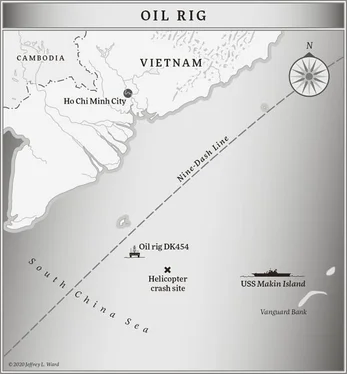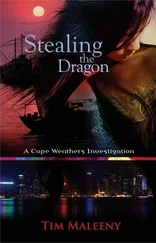Shoop pounded the steering wheel of his Taurus. Did she know he was following her? She was stopping at all the lights, wasn’t doubling back on herself, getting on and off a highway, or any of the usual countersurveillance-run maneuvers. She was barely even maintaining the speed limit. Shoop had to ride the brakes to keep from overtaking her. They were doing the same damn route again. When was she going to turn?
He stayed in the shadow of three other cars and a large delivery van with a picture on the side of what looked like the Albanian version of the Three Stooges.
They’d just taken the roundabout past the British consulate, heading east—again—when a silver Mercedes S 500 pulled alongside the Taurus at the same time the delivery van slowed. Boxed in, Shoop tapped his brake. He lost sight of Leigh Murphy for a grand total of six seconds—but when the van pulled forward and gave him enough room to squirt around in front of the Mercedes, the little gray Ford was nowhere to be seen.
Shoop’s stomach fell. He smacked the steering wheel again, cursing, craning his head back and forth, searching a sea of gray sedans for the gray sedan he was after. He thought he saw it, a gray Ford beneath a scraggly elm tree, pocked with early spring buds—but a fat man got out.
“Think!” Shoop chided himself.
A concrete median divided the boulevard, so she must have taken one of the two streets to the right. No way she had enough time to make it to the next cross street. Had she?
Shoop would have seen her if she’d taken the first right, so he turned down the second right, trying to put himself in Murphy’s shoes.
He didn’t know where she was going, but it sure as hell wasn’t to get a haircut.
26
Leigh Murphy took the first left after the roundabout, working her way through the narrow streets and double-parked cars in front of a mix of boxy apartment buildings and back-street shops that sold everything from pastries to truck tires. Zoning appeared to be an afterthought here. Sides of beef or mutton might hang in a butcher’s window next to an engine repair shop. Mehmet Akif High School for Boys was just over a block from Prison 313, a windowless fortress of brick, chipped concrete, and concertina wire.
Urkesh Beg lived between the school and the prison, in a tired-looking concrete six-story apartment building surrounded by a mote of gravelly alleys and a spooky overgrown lot that had once been paved but was probably rubble when the Russkies ruled Albania. An overpowering smell of garbage hung in the chilly air. The little ditch next to where Murphy parked gurgled merrily along with what she felt reasonably sure was sewage. A tumbledown brick wall—the kind where gobs of mortar look mashed from between each brick like the layer cake of an overzealous baker—ran along the street. In the shadow of the wall, an eight-by-eight block shed with a rusted tin roof sat tucked into the scrub brush. Murphy found herself wishing she’d parked farther away—or even on the other side of the apartment building. This place looked like a private stockade, or the cottage belonging to a resident witch. Either way, it creeped her out and she sped up, ready to deal with a disgruntled Uyghur.
He was smaller than she’d expected him to be. She’d looked up his photo while on the phone with Adam, and seen his descriptors. This guy might have been five nine, a hundred and seventy pounds at some point, but not anymore. Life had pounded him down good and hard, bending him where people were not meant to bend and shaving pounds and surely years off his life.
Murphy didn’t speak Uyghur or Chinese, so she greeted him in Arabic.
“As-salamu alaikum.”
He eyed her warily, bent as if he might topple forward at the slightest breath or misstep.
“Wa alaikumu as-salam,” he said.
He spoke English, haltingly, but assured her that he understood it very well from his time in U.S. custody.
Murphy introduced herself as a member of an NGO that was working to reunite Uyghur refugees with their children. To her surprise, he invited her in immediately.
“Come, come,” he said, raking the air with a cupped hand. “Please. I make you tea.”
He lived alone, with no family and few hobbies, from the looks of the sparse interior of the shabby but clean apartment. His nails were long, his hair unkempt. His only friends appeared to be the neat stacks of books and magazines in Arabic script and English stacked in various spots around the living area. Murphy noted just a few of the English titles— A Raisin in the Sun , 1984 , The Invisible Man , assorted Kafka … A well-worn copy of To Kill a Mockingbird sat open and facedown next to a mug of tea on a small table beside a sagging easy chair, as if he’d been up to the business of reading it when she’d knocked on his door. Not exactly books she’d expected to see in a Uyghur refugee’s home in the suburbs of Albania, but there was definitely a theme. You could get only so much by reading a person’s file.
He brought her tea and then retrieved his own, using a strip of white paper to mark his spot before reverently closing To Kill a Mockingbird and setting it gently on the table. Sitting across from Murphy, he told her that he was sorry but he could not help because he had no children to be reunited with. Where an American or European man might bawdily joke that he had no children “that he knew of,” Urkesh Beg looked at her soberly and left it at the apologetic denial.
Murphy learned early—likely well before The Farm—that a lie was easier to swallow when buttered with some truth. She set her teacup on her knees and bent forward, trying to make herself seem as small and unthreatening as possible. “Mr. Beg,” she said. “I am here on a very delicate matter. There are members of certain … shall we say … groups that China has deemed … outside the law—”
Beg’s countenance fell dark at the mention of China.
Murphy held up her free hand. “Please understand, I am in no way connected to the Chinese government. On the contrary, I do not even represent the American government.”
“That is good,” Beg said. “Because I hate the U.S. only a little less than I hate the Chinese government.”
Murphy had read the man’s file. She felt the urge to explain that although there was no question that the Uyghur people had been severely mistreated, it was no small thing to align oneself with Taliban forces, even for training, and then fire toward U.S. troops. Urkesh Beg was, in point of fact, fortunate to be upright and still breathing. Still, criminals in the United States did less time than he had for a hell of a lot worse. It wasn’t Leigh Murphy’s job to prove to him how right the United States was or was not in detaining him for so long. She needed to find out what he knew.
She took a contemplative sip of tea, letting the silence sink in before beginning. “The people I work with represent separated children, not nations. Unfortunately, members of the groups I’m talking to you about do not contact authorities regarding the location and fate of their little ones because they are afraid the Chinese government—”
Beg scoffed. “Or the U.S.”
“Or whomever,” Murphy continued. “Parents aligned with groups operating on the edges of the law fear making contact, leaving my organization with no way to find extended family for the children in our care—many of whom are too young to communicate with us.”
“Maybe you give me names of the people you are looking for,” Beg said. “I am not part of all this you speak of, but I know people who know.”
“I have a list at my office,” she said. “Perhaps we can meet tomorrow or the next day and speak in more detail. I do remember several of the smaller children had family members in the ETIM …” Murphy listed two other known Uyghur groups before bringing it home. Yao had been vague about why he was looking for Medina Tohti, but did mention she had a daughter. Murphy flipped the script on the details but kept the issue of parent and child the same. “… at least one, a three-year-old boy, if I am correct, has a father who is part of … I’m not sure I’m saying it correctly, the Wuming group.”
Читать дальше











![Александр Ирвин - Tom Clancy’s The Division 2. Фальшивый рассвет [litres]](/books/417744/aleksandr-irvin-tom-clancy-s-the-division-2-falsh-thumb.webp)
